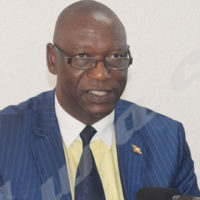Members of the European Union parliament voted to keep sanctions on the Government of Burundi. They say human right violations persist. The Government of Burundi accuses the EU of being partial.
 On 6 July, EU parliamentarians adopted a resolution on Burundi in which they uphold the decision of the European Union to suspend financial aid to Burundi’s government.
On 6 July, EU parliamentarians adopted a resolution on Burundi in which they uphold the decision of the European Union to suspend financial aid to Burundi’s government.
They said they are deeply concerned about the current security situation in Burundi.
The EU first suspended direct financial assistance to Burundi in March 2016, accusing the government of not doing enough to end the political crisis.
Sixteen months later, the EU has issued yet another strongly worded condemnation of the situation in Burundi and the lack of investigation into crimes committed. The EU also said they “deplore” Burundi’s intention to pull out of the ICC and call on the country to reconsider this decision.
Burundi government rejects EU parliamentarians’ resolution
Alain Diomede Nzeyimana, the deputy spokesman for the Burundian president, Pierre Nkurunziza has rejected the EU resolution. The government accuses them of being partial. “The Government of Burundi wishes to maintain a good relationship with the EU, but the latter must respect the sovereignty of our country. The EU decision is based on biased reports”, Nzeyimana says.
Economic sanctions are not enough to stop violence in Burundi, according to Pancrace Cimpaye, the spokesman for opposition platform CNARED. He calls on the international community to to intervene immediately before it is too late.
Before 2016, the European Union was Burundi’s [first] largest donor and contributed about 20% of the budget.
Burundi was plunged into political crisis in April 2015, when President Pierre Nkurunziza announced his re-election in the 2015 presidential vote. In ruling for a third term, members of civil society and political opponents accuse him of violating the constitution and the Arusha peace agreement, which ended the 1993 civil war.
According to the International Federation on Human Rights (IFDH), over 1,200 people have been killed since 2015; between 400 and 900 have been victims of enforced disappearances, while thousands of people have reportedly been tortured and over 10,000 detained arbitrarily.



















 IWACU Open Data
IWACU Open Data

